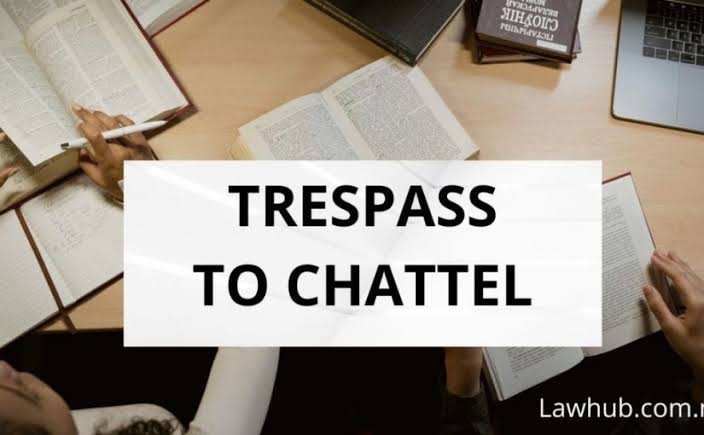N.B. This article is particular to Nigeria.
Trespass to Chattel
The tort of trespass to chattel may be defined as a direct and wrongful interference with a chattel in the possession of the plaintiff, such interference being either intentional or negligent.
By way of introduction, the word Tort means a wrong. A tort is any unjustifiable interference with the right of another person. It is a civil wrong which seeks to protect the right of persons and prohibit their being interfered with, as well as to provide for the remedy for civil wrong suffered by individuals as a result if such interference.
The purpose of the law of tort is to prohibit wrong and to provide remedy in different areas of law covered by the law of tort. One of such areas is trespass to chattel. By trespass to chattel, we mean trespass to goods.
The word chattel is defined as any movable or immovable property or thing which is capable of being owned, possessed or controlled other than a human being or real estate.
The tort of trespass to chattel may be defined as a direct and wrongful interference with a chattel in the possession of the plaintiff, such interference being either intentional or negligent. The interest of the plaintiff which are;
- His interest in retaining possession of the chattel
- His interest in the physical condition of the chattel
- His interest in protecting the chattel against inter-meddling
ACTS OF TRESPASS
Trespass to chattel may take various for such as destroying as evident in Sheldrick V. Abery, damaging or merely using good as illustrated in Pensfold wines Ltd V. Eliot, or wrongfully moving them as seen in Kirk V. Gregory.
A Nigerian case in which there was an actionable trespass per se to chattel is Davies V. Lagos city council. There the defendant council granted the plaintiff a hackney carriage license to operate a taxi cab in Lagos. The plaintiff was well aware that the permit was for his exclusive use and not transferable but he caused it to be transferred to a third party. On learning this, certain officials of the council seized the vehicle & detained it at LCC pound. In an action for trespass, Adefarasin.J. held that the council was entitled to revoke the plaintiff’s permit for non-compliance but it was not entitled to seize the vehicle. The learned judge said:
“The plaintiff is entitled to succeed in trespass… There may be a trespass without the infliction if any material damage by a mere taking or asportation..”
TRESPASS ACTIONABLE PER SE
Like other forms of trespass, trespass to chattel is actionable per se, that is to say, without proof of actual damage. Thus, the mere wrongful moving or touching of a chattel without any harm being caused is actionable. It is no defense in an action for trespass to chattel that the tort was committed when carrying out the instructions of the executive arm of govt as distinct from judicial Acts. In Ajao V. Ashiru, the plaintiff’s peppermill was seized by the defendant & the defense of the defendant to claim of the mill was seized by the police. the court held that the defendant was liable.
The supreme court in this case emphasized that the law of Nigeria is that those who set a Ministerial rather than judicial officer in motion in this way are as liable for the wrongful seizure if another’s property as if they had done it themselves.
The case of National coal board V. Evans remains a landmark case.
ELEMENT OF TRESPASS TO CHATTEL (INTENTION & NEGLIGENCE)
Originally, trespass to chattel was a tort of strict liability & it was unnecessary for the plaintiff to prove that the defendant’s act was intentional & negligent. But the modern rule is that either intention or negligence must be established & there is no liability for an interference with goods which is merely accidental.
Accidental trespass must be distinguished from cases of trespass by Mistake, for if the interference with the chattel is intentional, it is no defense that the defendant would not have committed the trespass if he had not been mistaken as to his right to interfere.
Another manifestation of the principle is the rule that a person whose chattel is damaged on or near te highway by the defendant’s vehicle must prove that the harm was caused by the negligence of the defendant. This is illustrated in Gayler & pope V. Davies & sons.
PROTECTION OF POSSESSION
Trespass to chattel protects possession rather than ownership. The plaintiff in an action for trespass to a chattel must have had actual possession of it at the time of the interference. This principle has the following consequences.
- As seen in Keenas V. CIE, even the owner the chattel would be liable if he interferes with it at the time when it is in the lawful possession of another person.
- A person who acquires possession of goods wrongfully can maintain an action in trespass against any person who interferes with the goods except the owner of a person acting under the authority of the owner. This is evident in Woadson V. Watson.
Contributed by: Abdulganiyu Ismail (AKA) Mastermind
Prepared and Written by: Ucheakonam Chijioke Joshua (CJ)


Leave a Reply